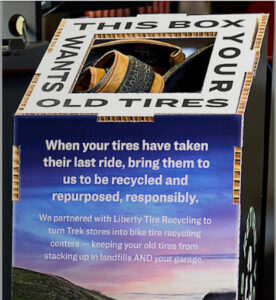Liberty Tire and Trek Partner to Recycle Bike Tires
From a used bike program, to emissions reduction in manufacturing, to the use of recycled materials, Waterloo, Wisconsin-based Trek Bicycle has been on a journey to build out its two-year old sustainability plan.
From a used bike program, to emissions reduction in manufacturing, to the use of recycled materials, Waterloo, Wisconsin-based Trek Bicycle has been on a journey to build out its two-year old sustainability plan.

Bicycle cycling has surged in the U.S. in the last three years as consumers look for sustainable and healthy forms of transportation, recreation, and mobility.
Trek Bicycle said the life of the average bike tire is three years or 3,000 miles. With more than 54 million people riding bikes at least once a year, that translates to a lot of tires, Statista Research reports.
In December 2024, Trek Bicycle, which manages more than 200 shops in the United States, launched another part of its sustainability plan with a bike tire collection and recycling program
Trek reached out to Liberty Tire Recycling and expressed concern that most bike tires today were going to landfills and wanted to know if we could work together to find a better way to give these tires a second life, Steve Callahan, Vice President of Inbound Sales at Liberty, said.
The companies partnered with the aim to provide cyclists with a free and responsible way to recycle their used bicycle tires. Cyclists can bring their worn-out bicycle tires to a participating Trek store, where they will be collected and recycled at no cost to the consumer.
“This program addresses the growing concern of tire waste in landfills and its impact on the environment and it helps to make cycling even more sustainable.
We’re committed to running our business as sustainably as possible,” Trek Brand Director Andrew Dutton, said.
“Joining this tire recycling effort lets us give riders an easy way to recycle their old bike tires responsibly and we’re proud to be part of it.”
Recycling bike tires is difficult—the volume of tires, the low weight, the lack of a built-in collection process and uncertainty around recycling them, all presented unique challenges.
But there were people at Trek and Liberty committed to making this work and it’s those people who really made a difference working through each hurdle and developing a collection and recycling system that would work.
There was a real cultural fit between the two companies—both are committed to sustainability and zero waste and both have employees who set high goals and then work hard to meet them.
Liberty’s collections are designed for passenger and truck tires, while bike tires require a different approach. This means they are collected, loaded onto trucks, and processed for recycling in a distinct way.
Working closely, Trek and Liberty collaborated to rethink and refine the entire process.
There hasn’t been a lot of bike tire recycling at scale so there was uncertainty around what products into which they could be transformed. Liberty worked with one of its facilities in the Mountain West to run pilot tests and figure out if these could be scaled across the rest of Liberty’s facilities.
“The good news is they can be recycled into almost all of the products we produce. including in landscaping, sustainable asphalt, tracks, fields, and more,” Amy Brackin, Senior Vice President of Sustainability for Liberty Tire Recycling.
Trek said the program will operate as an on-call service, which ultimately, was determined best for the stores and the environment. Liberty comes when a store calls, eliminating unnecessary trips and saving fuel.
In terms of collections at the store, the bike tires are collected in a repurposed cardboard box, which was originally used to ship bikes and bike parts to the store.
Liberty collects the filled boxes and loads them into trucks with normal passenger tires but because the bike tires are in boxes, Liberty has had to carefully incorporate where the box goes in the truck—so they don’t disrupt normal tire collections, Stratton Kiton said.
In stores, cyclists can look for a “Retire Your Tires” box where they can easily drop off their tires. Trek encourages all riders to take advantage of this program as part of their commitment to sustainable cycling practices.
“I’m amazed at what a positive impact this partnership has already had—we have others who are reaching out, inspired by this announcement,” Callahan said.
“Trek’s desire to do the right thing has really driven awareness with other people.”
© Scrap Tire News, February 2025






